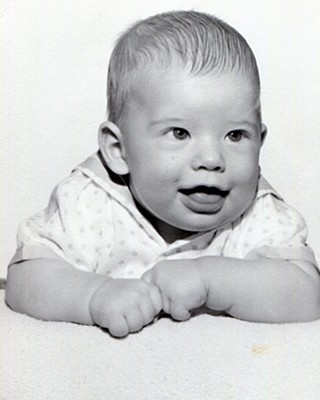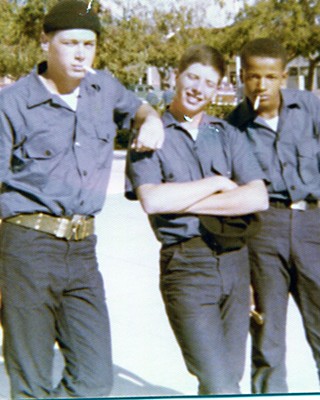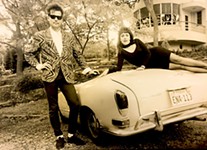His Name Was Gary Poulter
Meet the homeless man who became a movie star
By Joe O'Connell, Fri., April 11, 2014
Gary Poulter was a charming movie star with shockingly pale blue eyes and smooth dance moves. He was a smart kid from California who dreamed of joining the circus. He was a Navy man and a drunk. He was a homeless drifter missing most of his teeth and part of one ear. Gary Poulter was kind. Gary Poulter was vicious. Perhaps Gary Poulter was just a little like you and me.
Art Imitates Life
Casting agents John Williams and Karmen Leech were hunting down a different strain of actor for David Gordon Green's Joe, a film adaptation of Larry Brown's Southern gothic novel of the same name about a volatile ex-con who befriends a teenager and tries to save the boy from an abusive, itinerant father and a mean world that evokes William Faulkner's depraved Snopes family. "David said, 'Go and find me characters,'" Williams said. They cast a wide net, walking the streets of Austin and driving almost to Beaumont with stops at every Walmart, roller rink, and youth correctional facility along the way. They approached their job like cops – always alert, instinctively hunting for just the right face, that one persona that pops.
At Sixth and Congress, the duo found themselves chatting up a homeless family. "Don't talk to them!" a nearby man screamed at the family. Over to the side, a blue-eyed man with a crazed tangle of thinning white hair commanded in his gravelly chainsaw voice for the man to shut up and leave everyone alone. Williams and Leech began to examine this fiftysomething man more closely. He had an open wound on his head. He looked like he'd been on a drunken bender.
"I'm an actor," Gary Poulter told them.
In truth, Poulter's acting career was as a background extra on late Eighties TV series Thirtysomething. But he oozed charisma, and, oddly, he spoke fluent Japanese. They brought him in for a taped audition, and a grinning Poulter performed a pop-and-lock dance for the camera. They had Poulter in mind for a small part, but when Green saw the video, he sensed something bigger. Poulter was called back to audition for him in person and was offered the film's third lead: Wade, a drunken, abusive father who never settles in one place for long. In many ways, he was Poulter. "To me there's something about someone who's lived it," Williams said. "If they can act, it conveys on film. You can't fake cirrhosis of the liver."
But could a homeless drunk be trusted to come to work sober? Were there underlying mental health issues the film crew wasn't seeing? "We talked to his sister Maria [MacGuire], and she said he'd had his issues in the past, but this was his dream," Williams said. "If we could control him and keep tabs on him, she believed he could do it." Poulter and Green had a private conversation that sealed the deal. Then the new actor had lunch with film star Nicolas Cage at Annies on Congress, and the two bonded over a love of metal music. From the restaurant, Poulter called his sister. He handed the phone to Cage, who told her: "I just met your brother. He has the best sense of humor."
On the set, Poulter was known as Ozzie to avoid confusion with Tye Sheridan's character, Gary, the son of Poulter's Wade. Production coordinator Shanti Delsarte wanted Poulter to connect with the outside world, so she got him a laptop and set him up to talk with MacGuire on Skype. Delsarte was quickly charmed by Poulter, who came to the set even on days he wasn't filming and lent her his prized possession – a pair of roller skates. He restricted his drinking to beer and showed up to work sober. "He wasn't like, 'Thank you, you saved my life,'" she said. "He was humble and happy, but he was strong."
MacGuire, seven years his junior, hadn't seen Poulter in person for years before she flew to Texas from her Colorado home. Her brother had been hired by a traveling carnival, and the two reconnected over dinner. Back at home three days later, a desperate Poulter called. He'd been caught stealing money and had been left naked on the side of the road. She paid his way back to Austin, supplied him with a cell phone and paid for a motel room where he liked to show off his roller skating skills in the parking lot. A few weeks later he called with news of the film.
On Facebook, Poulter posted: "The production company moved me out of Motel 6 and decided to put me in Hampton suites...... THOSE BASTARDS!!!!! lol....Got to be on the set at 7:15..... The time is near........... I can't wait.......... Seems like it's taking forever.....I just found out that the kid that's playing my son.......Just did a 6 week shoot with Brad Pitt........CYA."
Life Imitates Art
MacGuire knew two distinct Gary Poulters: the cruel older brother she'd grown up with and the charmer she'd learned to forgive. The Poulters lived in Upland, Calif., a middle-class town 45 minutes from Disneyland. Young Gary loved to sew and could instinctively build things. He also threw Maria and her brother (who cut off communication with Gary decades ago) down the stairs. He got their dog drunk and left it in a dresser drawer for them to discover. During the summer while their parents were at work, Poulter would lock his siblings out of the house. They never told their parents. "He was diagnosed as bipolar," MacGuire said. "He was just a monster. As we became adults, I came to know him in a different way. His disease was so much stronger than he was."
Sister Debbie Altis is a year younger than Gary. As kids the two watched Lost in Space together and acted out the TV show. They rode bikes, walked to school together, played Kick the Can. "We decided when we grew up we would join the circus," she said. "I was the bigger daredevil." Gary was the smart, creative one. "The guy never had to study," she said. "My dad tried to get him into sports, but he was a brainiac." He was also empathetic, stepping up to defend an overweight girl with disabilities when classmates made fun of her and once clobbering boys who were rude to Debbie.
Freshman year Poulter made the kind of childhood friendship that lasts with Chris, a boy with whom he shared a locker at school. They were like brothers, Altis said. But Chris' home life was unhappy, and one day he stood on a crate, put a rope around his neck, and stepped off into nothingness. Gary later found a Ken doll someone had hung from a noose in their locker. "There was nothing any of us could do to comfort him," Altis said. Shortly after, the Poulters opted to have their son skip a grade in school. He started hanging out with older classmates. First he was smoking pot, then he moved on to harder drugs. "He was not a real strong person – not the leader type," Altis said. "He just got into the wrong crowd."
Poulter's dad was a stoic insurance salesman and jock who sometimes insulted his less athletic son; his mother was an accountant. The family went to church every Sunday and led solid lives. The change in Gary scared them, so his father pushed the boy into the Navy, a move Altis said he later regretted. At 17, Poulter found himself on a ship headed for Japan. One of the officers apparently had it in for him and threatened to throw Poulter overboard the first chance he got. Instead, Poulter went AWOL in Japan and wasn't seen again for a year and a half. He learned Japanese, did odd jobs, lived on the streets for the first time, partied, and finally ended up in the brig. His parents went to D.C. and fought to bring their son home. One dishonorable discharge later he was back. But he was different, Altis said. He moved back in with the family, but one day his father opened the door to find Gary choking his little brother. "I always tried to protect them," Altis said of her younger brother and sister. "I know Maria doesn't have a lot of good memories, but I do."
"I went to several AA meetings with him," Altis said. "He was in rehab. He'd straighten up and something would happen and he would go back to the way he was."
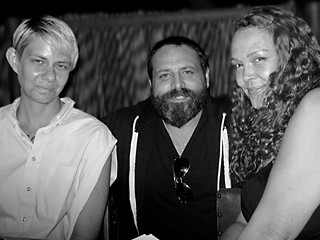
Meanwhile, Debbie's best friend Janette had always had a crush on Gary, and he finally noticed. They wed and had two girls. But he never stopped drinking and using drugs, and the marriage fizzled. Janette eventually remarried, and his daughters barely remember Poulter. His downhill slide had other moments of hope, but they soured just as quickly. Such as the girlfriend, an addict like him, who moved with him to Washington state to make a new life: "He came home from work and found her on the floor," Altis said. "She'd shot so much heroin it would kill an elephant."
The family showered Poulter with cell phones and loaned him cash. They saved him when they could. He was covered in blood and hallucinating creatures crawling on his skin when Altis found him in a California hotel. He threatened to hurt Altis so often she cut off contact and wouldn't let him know where she lived. She wouldn't even let Poulter visit as their father lay in his deathbed for fear of what Gary might do.
A New Life
But on the Joe set in Austin, Poulter showed up prepared and on time. MacGuire flew in with her son to watch the filming of a pivotal scene where he jumps from a bridge. She saw a producer near her cry at her brother's performance and resisted the urge to reveal that Poulter was acutely afraid of heights. In another scene, Poulter's character couldn't get up off the ground. Poulter really couldn't get up – he'd suffered a seizure that may have been triggered by years of alcohol abuse. "It was life imitating art rather than art imitating life," Delsarte said. He was back on set the next day. Before her visit was over, MacGuire had Altis and Poulter on the phone talking, making peace.
Poulter posted on Facebook: "The script called for somebody that looked like 'An old man, alcoholic, prone to violence, who looked like the aftermath of a human disaster.' My first day of shooting when I went to hair and make up. I asked the woman 'Bridgette' 'Do you need to do anything with my appearance?' She said 'No you're good!!!!!!!!!!!!!!' lol."
Poulter was loud, quick-witted, and sarcastic in a welcome way that broke the monotony of 12-hour days, said production assistant Hugo Garza, whose brief friendship with the actor reminded him not to assume about people that "where they're at now is where they've always been." At the Joe wrap party in December 2012, Poulter, clad in a black fedora and dark guayabera shirt, owned the dance floor. Another day, Poulter and Garza went to a liquor store on South Congress, parked, and spent the afternoon downing a bottle of cheap bourbon, Poulter's drink of choice. Poulter threw up in Garza's car.
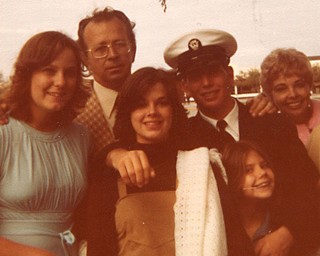
Suddenly Poulter's movie star life was done, at least for the moment, and his film crew friends moved on to other projects. Director Green bought Poulter new teeth as a wrap present. Poulter was up for a part in the film Parkland, but didn't get it. Williams had also suggested the actor for a project shooting in New Mexico. Poulter had to move out of the motel, but Delsarte let him stay temporarily in a house rented by the production company. Christmas Eve he invited a homeless man to stay with him. Poulter wrote on Facebook: "The last couple of days, I shared my house and billfold with a homeless man (nobody deserves to be on the street during holidays)....And he comes out of the door and tells me to fuck off and he doesn't like me too much...OMG I told him see them stairs? Walk down em or I can throw you down em.....He took the hint. He walked. The audacity of some people....But it won't stop me from helping people when i can..."
Garza took Poulter to Parkland's wrap party, where Gary danced but drank little. Poulter left his jacket, laptop, and cell phone at Garza's place, and a week later, the two met in an H-E-B parking lot for their return. Poulter was oddly sullen. He said he was going away for a long time. A line Poulter recites in Joe stays with Garza: "A person just don't know from one day to the next which one is going to be their last."
Fade to Black
Another seizure sent Poulter to the hospital, where the diagnosis was deadly. "Diagnosed with lung cancer....Aint that a bitch! Movie last month and terminal cancer this month.....talk about peaks and valleys," he wrote on Facebook on Jan. 2, 2013. The doctors said he might live six weeks or six months, but in a pre-Affordable Care Act world, it would be three months before he could get treatment. A week later he wrote: "I've decided I'm going homeless tomorrow.....I refuse to spend one more penny on a hotel room.............almost 2000 bucks already...fucking ridiculous.....I'm getting a tent.........."
"He was scared," Maria said of the cancer diagnosis. He'd had part of an ear removed for skin cancer years before, but this was big. She promised to take him in, to not let him die on the streets. The two communicated by phone, text, or email almost daily. When communication suddenly stopped, she got worried and reported it to Austin authorities. Two days later, he messaged her on Facebook: "Here I am. I fell off the wagon."
Three days after that, on Feb. 19, 2013, Austin police dispatchers received a call from a homeless man named Joseph who said Gary was dead at their campsite near the Congress Avenue Bridge. Investigators found Poulter face down in shallow water on the edge of Lady Bird Lake, his pants unzipped so he could urinate. His feet were planted in the green muck 10 feet from shore. Nearby empty bottles of liquor and blankets were strewn on the grass. Poulter had told his friend about his six months behind bars for breaking into the Chipotle restaurant at Eighth and Congress in 2011; he never mentioned starring in a movie. Poulter's death was ruled an accidental drowning with acute ethanol intoxication.
Williams said they wanted Poulter for that part in New Mexico.
Poulter never got to see Joe on the big screen, but Maria has. "It was emotional for me," she said. "It was hard to concentrate on the movie. Gary's not even acting. That's so totally him. He did a good job."
Joe opens in Austin on Friday, April 11. For a full review and showtimes, see Film Listings.






